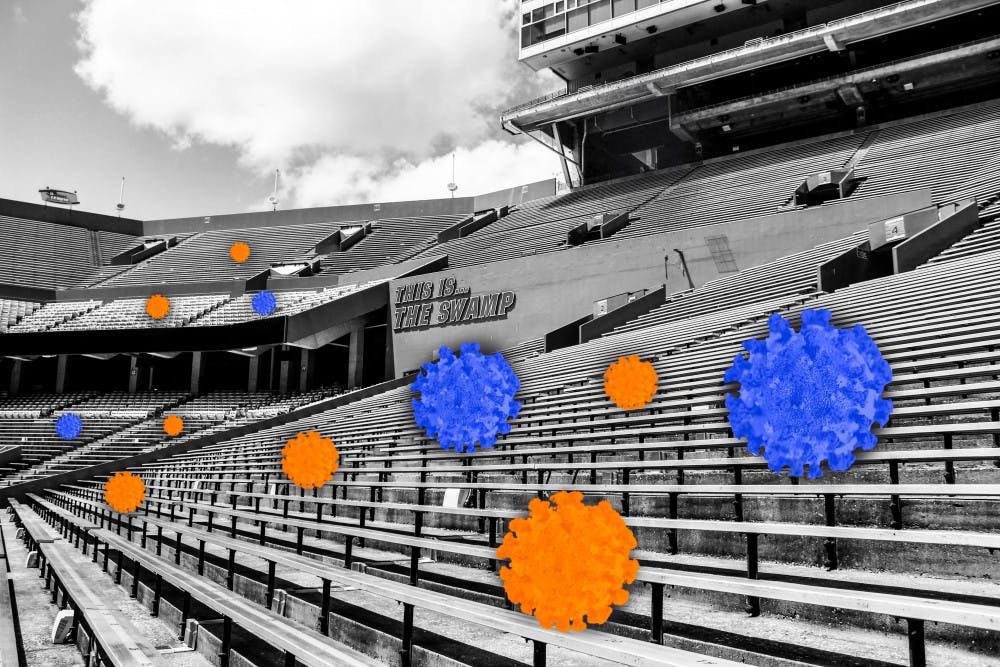Football gamedays in the fall are an important part of Gainesville’s culture. The tailgating, the sea of orange and blue, the rowdy fans and the spectacle of watching football with 90,000 other fans are all part of the college football experience.
However, with the COVID-19 pandemic affecting people around the world, it’s guaranteed that won’t happen this year. At least, not at full capacity.
Last week, Scott Stricklin, UF’s athletic director, mentioned in a Zoom conference the possibility of having fans in the stands.
“My guess is if you were looking at a strictly six-foot social distancing scenario with fans in the Swamp you're looking at 15-20,000,” he said. “Maybe you can get close to 25,000 fans, but it's a much different number than what we're accustomed to."
Schools like Texas, Ohio State and Iowa State have announced their plans to hold games in front of reduced crowds.
But with Florida having over 75,000 cases of COVID-19 in the last week according to the Centers for Disease Control—the most out of any state in the country—there are questions about safety and public health that come with hosting large events during a pandemic.
Joshua Weitz, a professor in the School of Biological Sciences at Georgia Tech, and his team created the COVID-19 Event Risk Assessment Tool, which estimates the odds of at least one person at an event having COVID-19. Currently, there’s a 98 percent chance that at least one person has the virus at a 100-person event in Alachua County.
“Although outdoor events are generally less risky than indoor events, fans must access their outdoors seats via indoor spaces, leading to crowding, extended periods indoors, many opportunities for touching the same surface, etc.,” Weitz wrote in an email. “The failure to control COVID-19 levels and the fact that Florida is a hotspot for infection means that planning a massive sports event now is a terrible idea.”
Stricklin didn’t elaborate on how attendance would work in regards to how tickets would be dispersed or what guidelines would be in place. The UAA is still working on various models for different scenarios in the fall, according to UAA spokesperson Steve McClain.
Aside from the sheer volume of people in one area, there are also concerns surrounding social distancing, travel and how people can still end up in crowded areas, such as entering and exiting the stadium. While social distancing is usually understood to be six feet, some might say that might not be enough in this case.
“Given that people tend to believe that these kind of viruses are airborne and also in sports events like a football game, where people will be excited and maybe cheering or yelling, I would just say that six feet is a little bit of a concern,” Yang Yang, an associate professor in UF’s department of biostatistics, said. “If you wanted me to give you a number, I would say either nine feet or above. Or, six feet may be okay, but wearing a mask is probably a must.”
Yang said that the mask requirement could be difficult because wearing them for long periods of time—college football games are usually about 3.5 hours—could be uncomfortable, especially in the Florida heat.
Natalie Dean, associate professor in UF’s department of biostatistics, echoed Yang’s concerns about possible transmission during a game.
“My concern is with people yelling because football involves a lot of cheering from the fans,” Dean said. “It’s lower risk outside, but it’s higher risk because you’re yelling.”
Another issue that Yang brought up was the issue of traveling fans. Fans could either unknowingly spread it to others in attendance or catch it at the game and bring it home. Games could also expose students to the virus as well.
Yang recommended that the entering and exiting processes be extremely streamlined and guided by staff to ensure that they are done carefully to avoid crowding.
Problems can also arise from other ways that fans could come into contact with each other, primarily in areas like concessions and bathrooms, according to Dean.
She added that, ultimately, she’s more concerned about needs that are more important than hosting football games because of the recent increase in cases.
“Given the state of the epidemic in Florida right now, it’s hard for me to imagine how this could be done safely,” she said. “We have a lot of big things we need to deal with to get the numbers under control.”
There are ways to minimize the risk of transmission as much as possible in addition to the mask requirement and social distancing, with Dean suggesting that fans stay home if they feel any symptoms.
But she pointed out that that could be difficult because fans could still spread it to others as an asymptomatic carrier or lie about not having any symptoms.
“It’s difficult because you’re going to tell people not to come if they’re feeling any symptoms,” Dean said. “But then there becomes this sort of perverse incentive then for people to not reveal that maybe they have a sore throat because they want to go to a football game.”
But UF and other schools might not have a choice when it comes to admitting fans for games if they happen. Schools across the country are cutting some of their sports teams in order to avoid losing more money, such as when Stanford announced earlier this month they would cut 11 of its 36 teams after the 2020-21 academic year. Athletic departments across the country may be forced to have fans regardless of the risk involved in order to recoup revenue.
“If we don’t have to do this, I would suggest not doing this,” Yang said. “If we have to do this or the university decides to do this, I think it’s important to have rules for how this is going be arranged and have something ready to facilitate contact tracing if people are identified with cases later.”
Follow Brendan on Twitter @Bfarrell727 and contact him at bfarrell@alligator.org.






